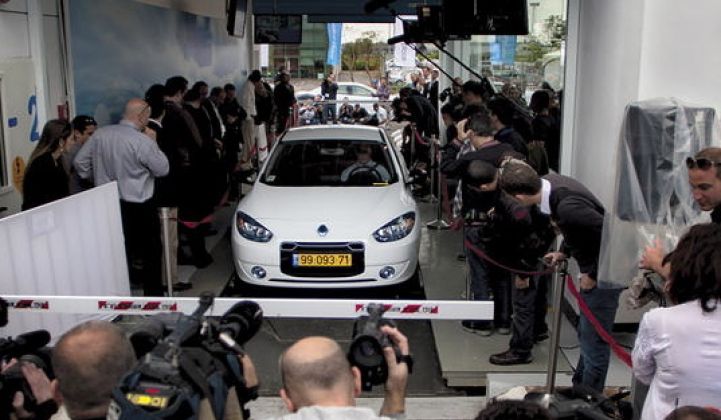Better Place, a startup with big plans to make battery swapping a standard feature on the world’s future electric vehicle fleet, is drastically scaling back its ambitions. Forbes’s Todd Woody reported last night that Better Place is scaling back its U.S. and Australian operations to retrench in the two tiny countries where it’s furthest along so far: Israel and Denmark.
It’s a pretty severe setback for the startup with about $850 million in venture capital funding and billions of dollars in would-be projects around the globe. Better Place spokesman John Proctor told Woody that the company was working on “an orderly wind-down to fulfill all our commitments,” but that the Better Place board had decided to stop investing more money in the big markets it’s leaving.
It’s not entirely unexpected news. Better Place replaced its founding CEO, former SAP executive Shai Agassi, in October, amidst continuing losses and a slower-than-hoped-for rollout of its inaugural battery-swapping subscription service in Israel. So far, that program is limited to drivers of the Renault Fluence Z.E. electric sedan -- the only car built so far to comply with Better Place’s battery swapping system. A similar program in Denmark has also grown slowly, despite generous government incentives for EV purchases.
But the company’s grand-scale plans for battery swapping station networks in Australia, Hawaii, the San Francisco Bay Area and elsewhere haven’t gone to plan. Better Place’s Bay Area scheme, for example, was scaled back from an ambitious $1-billion-plus project to a tiny electric taxi pilot in San Francisco, backed by $3 million in California Energy Commission funds. (Woody reports that this project is now canceled as part of Better Place’s retrenchment.)
As Eric Wesoff has consistently written about Better Place, the company was asking the entire nascent plug-in automotive infrastructure to take a leap of faith that its competing battery-swapping concept would eventually take off. In so doing, they’d be demanding that EV makers like Tesla, General Motors and Nissan completely redesign their vehicles, including their precious and fine-tuned energy storage systems, to meet the startup’s needs.
Agassi’s replacement, Better Place Australia CEO Evan Thornley, himself stepped down in January, a move that now appears to fit in with the company’s decision to cease investing in Australia. While the company named Dan Cohen as interim CEO, Idan Ofer, chairman and head of Israel Corp., a majority shareholder in Better Place with some $300 million invested, also took on some executive duties.
Better Place was founded in 2007 and has raised VC funding of more than $850 million from GE, UBS AG, Israel Corp., HSBC Group, Morgan Stanley Investment Management, VantagePoint Capital Partners, Ofer Group and Maniv Energy Capital.
Better Place promotes its battery switch model:



